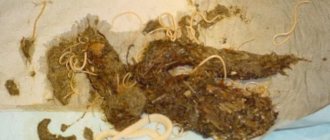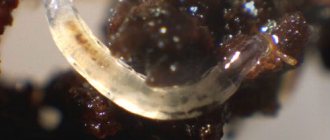Before vaccination, the dog must be given anthelmintics. This is very important because the body, weakened by parasites, may not cope well with vaccination and give a negative reaction in the form of fever, diarrhea, vomiting or even seizures. In addition to an adverse reaction, the body may simply not develop immunity to the vaccine. Any pet can be affected by worms, and it doesn’t matter whether he walks outside or sits at home.
General information about deworming
Deworming is an integral part of health and preventive procedures aimed at destroying worms and their eggs in domestic animals. If worms are found in your puppy, you need to know what to do. After all, parasites can cause many health problems.
Anthelmintic for dogs before vaccination: rules and recommendations
Measures to destroy helminths help prevent:
Advertising:
- the occurrence of diseases caused by parasites;
- the appearance of helminthiases in offspring;
- infection of people and other pets.
The main principle is the smallest portion of the product with the greatest benefit.
How often should I give my dog anthelmintic?
This question worries many owners. Anthelmintic drugs designed for puppies of different ages can be used as prevention and treatment. Most veterinarians are of the opinion that it is optimal to worm animals up to four times a year. It is not necessary to strictly link these events to calendar dates; it is enough to simply observe the frequency.
Anthelmintic drugs designed for puppies of different ages
How often is it allowed to deworm adult pets and puppies? In order not to harm your pet, you need to remember some nuances:
- Preventive deworming is carried out systematically, starting from two weeks of age. Further treatment is prescribed taking into account the vaccination schedule. 10-14 days before vaccination, the body is treated against helminths;
- therapeutic worming is performed as prescribed by a veterinarian, but only when tests show the presence of helminths, or when worms are noticed in dog feces;
- poison protozoa before mating to prevent infection of newborns;
- severe infection requires re-treatment 10 days after the first worming.
Anti-worm medications are used monthly for puppies up to six months of age.
Therapeutic worming is performed as prescribed by a veterinarian, but only when tests show the presence of helminths
Why worm your dog?
Worms produce toxins that poison the dog’s body. If there are a lot of helminths in the puppy’s intestines, the result will be a blockage of this important organ. Further consequences are rupture of its walls and death. Certain situations require deworming an animal.
Before complex vaccination or vaccination
It is necessary to worm your pet before vaccination or vaccination. If they are not carried out in a timely manner, the dog may become infected with diseases that are difficult to treat.
The purpose of vaccination and inoculation, as is known, is to develop immunity to diseases, for which a vaccine is introduced into the body in small doses. And if your faithful friend has helminths in his body, his immunity will be weakened. The body may not be able to withstand the load and succumb to the disease instead of learning to fight it.
Before sterilization
Usually, before sterilization, the veterinarian recommends unscheduled deworming treatment. If this is not done, the dog’s body will be weakened. Complications may arise.
For prevention
For good owners, the well-being of the animal is important. Since tape, flat and round helminths have a detrimental effect on the dog and deplete the body, deworming is also recommended for prevention. Otherwise, you may not notice that your four-legged friend has suffered internal organs or that the body has been exposed to toxins. In puppies, the consequences can be especially disastrous, because parasites deprive their fragile bodies of such important vitamins and minerals.
Classification of anthelmintic drugs for dogs
Anthelmintic drugs for dogs are classified according to their composition, principle and spectrum of action. When purchasing a product, you should definitely take these points into account. The classification will help you navigate when choosing medications.
Anthelmintic drugs for dogs are classified according to composition
According to the operating principle
Depending on what happens to helminths under the influence of the substance, they are divided into:
- leading to paralysis of protozoa - “Albendazole”, “Piperazine”, “Pyrantel”;
- blocking the metabolism of worms - “Mebendazole”, “Aminoakrihin”, “Pirvinium”;
- damaging protective covers of helminths - “Fenasal”, “Praziquantel”.
According to the spectrum of action
The spectrum of action is determined by laboratory tests of the biomaterial. This will help you choose the most effective substance. The components are distinguished according to the spectrum:
- those that affect protozoa living inside the intestines (nematodes, cestodes) - “Pyrantel”, “Perviny”, “Carbendatsim”, “Fenasal”, “Praziquantel”;
- affecting extraintestinal parasites (trematodes, extraintestinal nematodes) - “Praziquantel”, “Ditrazine citrate”.
The spectrum of action is determined by laboratory tests of the biomaterial.
According to active substance
The presented list of drugs used to poison various types of worms in puppies and dogs is by no means exhaustive. The most effective active ingredients are given:
- decaris;
- albendazole;
- mebendazole;
- pyrantel;
- piperazine
What is the best anti-worm treatment for puppies?
Offspring can become infected with helminths while still in the womb, and after birth through mother's milk. It should be noted that the puppy has one type of worms, which causes the disease toxocariasis.
During various hormonal processes, the larvae become active and pass through the placenta to the embryos.
How can you tell if your puppy has worms? All babies are born already infected with Toxocara eggs. In females, there are always larvae of these helminths in the muscles, but they are not active, and it is impossible to determine their presence. During various hormonal processes, the larvae are activated and pass through the placenta to the embryos. In newborns, toxocara are located inside the abdomen, here they pose a particular danger, so they must be destroyed as soon as possible. Therefore, deworming of a litter of puppies for the first time should be carried out on the 14th day from birth.
In the fight against toxocariasis in dogs, medications containing pyrantel are used. Taking into account the development cycle of helminths, the medicine is given to young animals constantly, twice a month. After the 1st year, dogs are treated quarterly against this type of parasite for prevention.
Important rules for deworming
The first anthelmintic is given to a two-month-old puppy, before the first vaccination. This is an important period because the baby is exposed to it, and it is unknown what reaction he will give to the administration of the drug. For everything to go well, it is important to follow the rules:
- A week before giving the dog anthelmintic tablets, it must be treated for fleas; for this, special drops must be applied to the animal’s withers so that it cannot reach them with its tongue.
- Deworming is carried out in the morning before meals; it is more effective than at other times of the day.
- The dose of the anthelmintic cannot be increased; the drug must be given strictly according to the instructions.
- The medicine should not be given a second time, even if it is not completely ingested, or the pet spits out the tablets. In this case, deworming can be carried out a second time no earlier than after 70 days.
- Before taking an anthelmintic, it is better to give the dog an immunostimulant, for example, Gamavit.
- 1.5 hours after the administration of the drug against worms, it is better to give the puppy an absorbent, such as activated carbon.
- 6 hours after the administration of the anthelmintic, the dog should go to the toilet and have a bowel movement. If she doesn’t succeed, then you can give her a mild laxative, for example mineral oil, Duphalac.
After taking an anthelmintic, the puppy must have constant access to clean water because the anthelmintic causes extreme thirst and dehydration.
Effective medications for small puppies
For the treatment and treatment of the smallest pets, special means have been developed so that they can be dewormed with minimal consequences for health. Be sure to pay attention to the age and weight indicated on the packaging.
Effective medications for small puppies
Anti-worming medications depending on the puppy’s age:
- at 1 month - Drontal Junior suspension (1 ml-1 kg of weight);
- at 2 months - Dosalid tablets (10.5 mg-1 kg of weight);
- at 3 months - Milbemax tablets (0.5 tablets - 1 kg of weight);
- at 4 months - Prazicide suspension (1 ml-1 kg of weight).
Condition after cleaning: normal and deviations
Toxic substances in the drug and decay products of parasites in the animal’s body can cause intoxication. Therefore, it is important to monitor the dog’s condition and behavior, especially in the first hours after taking an anthelmintic.
Warning signs:
- lack of coordination, unsteady gait;
- convulsions;
- dilated pupils;
- increased salivation;
- vomiting mucus, watery diarrhea after deworming;
- pallor or cyanosis of the mucous membranes;
- the dog does not eat and refuses water;
- can't go to the toilet.
If the dog feels unwell after deworming, it is necessary to induce vomiting in the pet so that it vomits, and then give it an absorbent. If this does not help, you need to contact your veterinarian.
Important! If your pet is very lethargic after treatment, pay attention to his feces. If there are no dead worms in them, there is a chance that they are curled into a ball that cannot pass through the intestines. Perhaps the pet got sick because of this.
To avoid having to treat your pet for worms, it is important to pay attention to preventive measures. And this is not only the timely use of pharmaceutical drugs. Try not to let your animal walk on its own, and during a walk, watch your pet so that it cannot eat something from the ground or drink water from a puddle or open reservoir. Also, do not forget to treat the animal for fleas, which are carriers of internal parasite eggs.
Features of anthelmintic measures in some dog breeds
Among dog breeds, there are those that are particularly sensitive to a certain active component of anthelmintic medications. In order not to put your pet at risk and to prevent allergic reactions, you should not use medications that contain aggressive components.
Among pets that are highly sensitive, the following breeds stand out:
Among dog breeds, there are those that are particularly sensitive to a certain active component of anthelmintic medications.
- Australian Shepherds;
- bobtails;
- long-haired whippets;
- collie;
- silky windhounds;
- Sheltie
This susceptibility is associated with the presence of mutations in the gene structure that distributes drug components within the dog’s organs and systems.
Externally, individual increased susceptibility manifests itself:
- depressed state;
- paresis;
- trembling in the body;
- allergic manifestations (in particularly difficult cases, anaphylactic shock may develop).
Features of anthelmintic measures in some dog breeds
Before deciding what to give for worms to a mature animal or puppy, it is necessary to take into account that sensitive breeds often do not tolerate the active substance ivermectin. Therefore, carefully re-read the composition.
What to do if taking medications causes the above symptoms in your pet? Whatever the symptoms of poisoning, you should show your dog to a veterinarian.
Which form of release is the most effective?
The form of release of anthelmintic drugs does not affect the result. Only the speed of action can differ. In specialized pet stores you will find different types of medications. It is worth purchasing them based on convenience. You can choose from the following forms:
- tablets;
- paste;
- drops;
- suspensions;
- injection solutions.
The form of release of anthelmintic drugs has no effect on the result
Types of anthelmintics
Now there is a wide variety of anthelmintics, and in different forms of release.
Pills
The most common remedy that is in demand among dog breeders. The most widely used tablets: Dironet, Dosalid, Febtal combo, Dirofen, Canikquantel plus, Pyrantel. The medicine must be given strictly according to the instructions; in no case should the dose be increased or decreased.
To give anthelmintic tablets, some owners use tablet holders or hide them in a piece of meat or sausage. If the puppy is less than two months old, then he may not swallow the tablets, then they need to be crushed and given in the form of a powder dissolved in water. To do this, you can use a syringe with a previously removed needle.
Suspension
Deworming with this form works well for puppies that cannot swallow tablets. The suspension is administered using a syringe with a measure included in the package. Common suspensions: Drontal Junior, Prazitel, Helmintal, Dirofen, Prazicide.
Drops on the withers
The newest type of anthelmintic. This product enters the animal's body through the skin. The advantages of this remedy: it does not need to be given forcefully, like tablets, it does not harm the dog, but it copes not only with worms, but also with ticks and fleas. The most common drops: Dana, Prazicide.
You cannot buy unknown medicines, and before use you must check the expiration date of the drug.
How to give medicine to a dog?
Each medicine is accompanied by detailed instructions on the rules of administration and dosage. There is an indication of the age for which it is intended.
You need to be especially careful when measuring the required amount of medicine, because the composition contains toxic substances. The indicated dosage will not cause negative consequences for dogs, but exceeding it is dangerous, even fatal.
To worm a puppy, it is forbidden to choose products for people. The wrong dosage is fraught with disastrous consequences.
To worm a puppy, it is forbidden to choose products for people
Pills
How to give an anti-worm tablet? You can do this in different ways :
- The tablet is masked with food that your pet particularly likes. It is necessary to ensure that the dog has eaten all the medicine;
- mix the crushed tablet into the food (there should be a little of it);
- when it is undesirable to crush a tablet or capsule, they are used whole. The pet is seated, the head is slightly tilted back, the medicine is placed on the base of the tongue, and the jaws are closed. They keep it this way for a while until the dog swallows the pill.
The dog can spit out suspension medications, so they are used during feeding.
Please note: do not push the medicine down the throat; the animal may suffocate.
Among the drugs that are in demand are the following:
- "Prasicide." Approximately 130 rub. 1 tablet per 10 kg of weight. Give in the morning, mixing with food.
- "Dirofen Plus". From 30 rub. 1 tablet per 5 kg of weight. Give during feeding, mixing with food.
- "Milbemax". From 360 rub. 1 tablet per 5-10 kg of weight, up to 5 kg 0.5 tablets.
Review of anthelmintic drugs
There are many dewormers for dogs. They can be either broad-spectrum for preventive treatment or targeted for getting rid of a specific type of parasite. It is recommended to select the drug based on the age and weight of the animal, as well as the recommendations of the veterinarian.
Anthelmintic drugs are produced in the form of tablets, drops, suppositories, suspensions and pastes. The release form does not play a key role when choosing a product. It is important that the owner is comfortable using it and accurately calculates the dose. For example, tablets and dragees are usually used for worming adults and large dogs. Dewormers for puppies and small breed dogs are often produced in the form of suspensions.
Here are the names of some anthelmintic drugs:
- Azipirin. The drug is intended for cats and dogs, available in tablets (1 tablet per 10 kg of weight). Destroys flat and round worms. The advantage is low toxicity. Therefore, it can be used for worming pregnant and lactating bitches. Azipirin can be given to puppies from the age of four weeks.
- Dehinel Plus. An anthelmintic that destroys round and tapeworms. Intended for dogs of large and medium breeds (1 tablet per 35 kg of weight). Suitable for deworming pregnant and lactating dogs in the second half of pregnancy. The drug can be given to puppies no earlier than 7 weeks.
- Prazitel. Has a wide spectrum of action against round and tapeworms. Available in the form of a suspension and tablets for puppies, small, medium and large breed dogs. The suspension comes with a special dispenser syringe. The drug is contraindicated in puppies under 2 weeks of age, pregnant and lactating bitches, as well as malnourished animals.
- Drontal plus. Taken at the rate of 1 tablet per 10 kg of animal weight. No pre-diet or laxative intake is required. As a preventative measure, it is recommended to use the drug once every 3 months, as well as 10 days before vaccination and 10 days before mating. This anthelmintic is contraindicated for puppies of small breeds, as well as dogs in the first 2/3 of pregnancy.
- Helmimax. The drug has three types of dosage: for dogs of small breeds (1 tablet per 2-4 kg of weight), medium (1 tablet per 5-10 kg of weight) and large breeds (1 tablet per 10-20 kg). The product is allowed to be taken by pregnant bitches, but no later than 3 weeks before giving birth. The chicken flavor makes the anthelmintic appetizing to the animal, but can provoke an allergic reaction.
Read Causes of diarrhea in puppies: what to do at home
Some people prefer to remove parasites using folk remedies, for example, celandine, tansy infusion, pumpkin seeds, garlic, etc. Some of them not only do not have proven effectiveness, but can also be dangerous for the animal. If you are used to giving your dog decaris for worms, be sure to follow the dosage and take into account contraindications.
Suspensions
The dog can spit out suspension medications, so they are used during feeding and mixed with food or milk. Large dogs can be poured into the mouth with a spoon; this option is not suitable for a puppy, as the suspension will be spat out.
The liquid medicine is administered with a syringe after removing the needle. To do this, you need to hug your ward from the side, move his lip, squeeze the liquid onto his cheek.
The liquid medicine is administered with a syringe after removing the needle.
Popular suspensions:
- "Dirofen" (1 ml - 3 kg of weight);
- "Helmintal" (1 ml - 10 kg of weight);
- "Kaniquintel-gel" (0.5 ml - 1 kg of weight).
The price for suspensions starts from 120 rubles.
Drops on the withers
To apply the liquid to the withers, you need to part the fur and drip the drug onto the skin. For a puppy, you can additionally apply it to the skin between the shoulder blades; for large dogs, the product is dripped along the ridge at several points. Some drugs need to be rubbed in.
Prices start from 100 rubles. The most famous drugs:
Helminthal drops on the withers for dogs: reviews and instructions for use
- "Helmintal";
- "Advocate";
- "In-Up complex".
How to properly worm a puppy and an adult dog
Before you start driving away worms, it is recommended to prepare the animal’s body using some kind of immunostimulant. If you are giving deworming to your dog for the first time, you should have an absorbent on hand. An absorbent is also necessary when you give anthelmintic drugs to puppies and weakened animals. Before giving your dog deworming medication, you need to get rid of fleas and ticks.
If the instructions for the drug do not contain specific instructions, it is better to give the deworming remedy to the animal in the morning on an empty stomach. Before deworming, your pet must be weighed in order to correctly calculate the dosage of the drug. You should not give the product “by eye” - an overdose can cause poisoning.
If your pet vomits or spits out part of the tablet, you do not need to give a second portion of the drug right away. It is better to repeat the procedure after 10-14 days. It is advisable that the dog has a bowel movement within 6-8 hours after taking the drug. If this does not happen, you can give your pet a laxative. When using drops on the withers, it is not recommended to bathe the dog for at least 2 hours after treatment.
Important! Often, deworming drugs cause dehydration and thirst. Therefore, the dog should have free access to clean drinking water.
Pastes
The pastes are packaged in dosed containers that look like a syringe with a narrow hole. There is also a special dispenser. If puppies have worms, insert the container between the teeth, squeezing out the required dose of contents.
Price from 120 rub. The most famous:
- "Dirofen";
- "Kaniverm."
Dirofen for puppies and dogs
Use 1 ml for every 2-5 kg of weight.
Contraindications for worming
Anti-worm medications are toxic, and their uncontrolled use can cause deterioration in the animal’s health. Deworming has a number of contraindications that must be taken into account. Deworming is contraindicated:
- sick, weak and exhausted animals;
- dogs after surgery;
- puppies up to 2 weeks;
- if the animal has external parasites: fleas, lice, ticks.
Read Real reviews about Superflex supplement for dogs, price and characteristics
Antihelmintics should be given with caution:
- pregnant and lactating dogs;
- animals with chronic diseases;
- animals prone to allergies.
Signs of probable poisoning during deworming and prevention of intoxication
If worms are found in a puppy, it is necessary to carry out a deworming procedure, strictly observing the doses indicated in the instructions for the drug. If they are exceeded, your pet may show signs of poisoning. Intoxication can also be a consequence of improper use of drugs.
You can tell that poisoning has occurred by the appearance of the following symptoms:
- lethargy;
- loss of appetite;
- vomiting or stomach upset;
- unconscious state.
If at least one sign is observed, you should immediately contact a veterinarian. You can’t hesitate or do the treatment yourself. To avoid putting your pet’s health at risk, follow the instructions for the medications. Carry out deworming systematically in consultation with your veterinarian.
Answers to frequently asked questions
Hosts often ask similar questions. The most common of them concern contraindications.
Is it possible to deworm in such situations?
This type of question can be roughly combined with the following phrase: “What if my dog has...” And then there is a specific situation.
During heat
No, it's not worth it. It is better to do this 2 weeks before the heat.
During pregnancy or nursing
No. Possible embryotoxic effects and disruption of the normal development of the offspring.
Before sterilization
Yes, as described above, this is even mandatory and is done in about 10 days.











